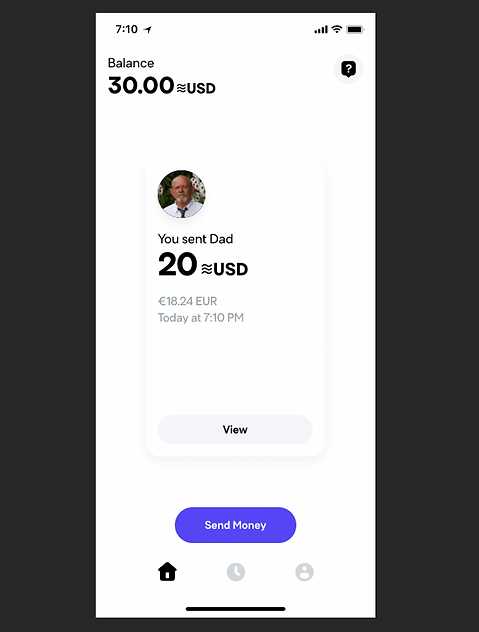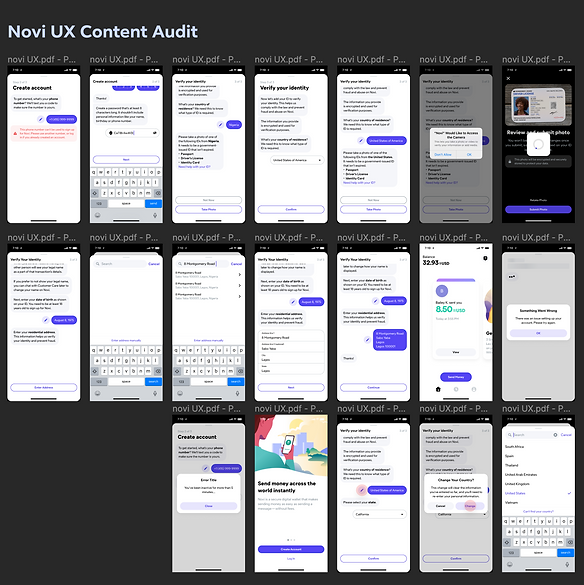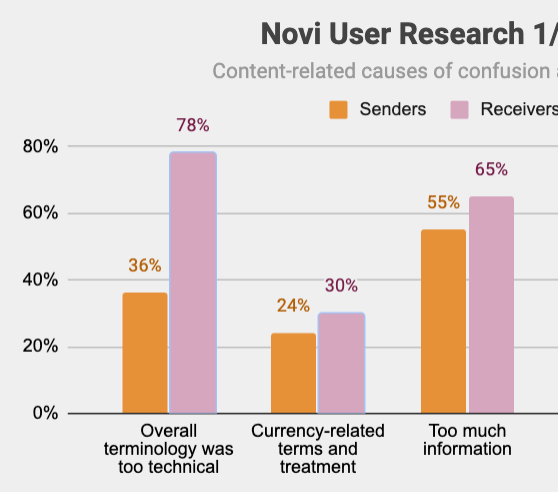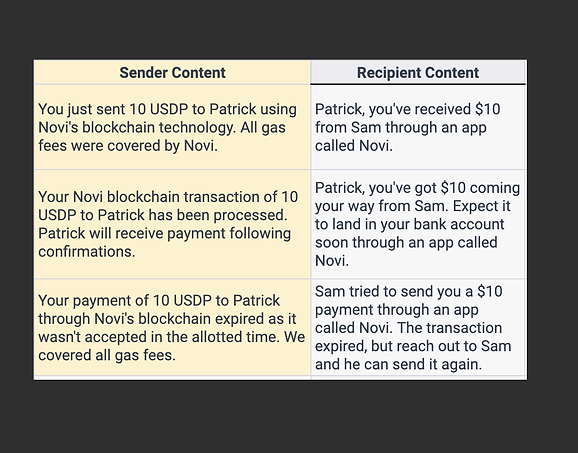Background
Meta's digital wallet, Novi, aimed to simplify financial transactions, especially remittances. Using a blockchain-based payment system, Novi aimed to disrupt international money transfers by making them faster, cheaper and easier.
I developed Content Design Standards (CDS) & Principles for the Novi Core Experiences (UX) content team, addressing inconsistent user-facing content based on my CDS experience with Shops and MFT Trust & Safety.

Process

Content Design Standards provide a framework for user-friendly UX content within a product or system. They address inconsistencies, visual and written, to improve user comprehension and trust.
To address this, I first initiated a comprehensive content audit, pinpointing consistency issues and dropoffs. I then led a UX research effort to understand gaps between senders and receivers. I then built the CDS, introducing a bifurcated content strategy to tailor messaging for diverse audiences (e.g., simplified for recipients, technical for senders). I also established three foundational Content Principles (Evidence-Based, Transparent, Relevant), ensuring consistent and trustworthy content decisions.

Approach
GOAL
Establish the Novi CDS as a unified, practical resource for all Novi XFN. Ensure widespread adoption and access for CDs across the org. Upon completion, the standards should streamline the content creation process while improving clarity for users. The Novi CDS should be practical rather than inspirational - we want CDs to check them before and while building content.
First step of my solution was to embark on a research phase to understand the current state of Novi content standards and identify areas for improvement.
STEP 1 | Audit
-
Audited Novi UX content throughout all surfaces; noted inconsistencies and errors ------------------------>
-
Met with CDs and XFN responsible for core Novi functionality as well as Care, Novi on WhatsApp and Novi for Messenger
-
Reviewed existing best practices/standards
-
Conducted in-depth interviews and consolidated feedback.
-

User Research
STEP 2 | User Research
In addition to securing input from my coworkers, I initiated an effort with the UXR team to understand user concerns. Overall, my proposal was an attempt to view our existing product through the eyes of a user, rather than a product-focused approach that was the status quo.
During the sessions, eager users expressed frustration with confusing content. One notable trend was the gap in understanding between senders (who are usually more tech-savvy) and receivers. This example, among many others, would be addressed in the standards.
Findings
STEP 3 | Findings
My audit and interviews showed:
-
Novi indeed lacked unified Content Design Standards. There were some basic Best Practices for Novi content on Figmas but they needed work:
-
Outdated and incomplete, often applying to very specific instances only.
-
Overlapped with the overall FB Content Design Standards.
-
-
Novi lacked Design Principles. To address this, I included product design leadership during my XFN interviews to build a comprehensive approach.
-
40+ significant instances of contradictory formatting, inconsistent terminology, and opportunities to improve content clarity.

Solution | STANDARDS
Different Audiences
Problem
Novi serves a diverse range of audiences - from senders to Recipient, users in Indonesia to those in Europe, etc. Each audience has distinct language needs and preferences. Thus, we need a nuanced communication approach instead of a one-size-fits-all strategy.
Bifurcation
User research proved Senders have a significant higher level of both patience and tech-savvy. As a result, I created standards on how to speak to each audience. Content for Senders included more technical info and concepts such as stablecoins, gas, and blockchains. Recipients received a simplified version, especially on the first interactions. Here's an example of how that played out in Notification content.
---------------------->
Results
Later research sessions and A/B testing proved these different approached resonated with our users. For example, successful receipts of initial payments increased by 24% after implementation of the bifurcated content.
Solution | PRINCIPLES
Novi Content Principles
After research, I created three up-to-date Content Principles that every Novi CD & PD can refer to. The following principles work within Meta’s universal content principles. They guided content decisions at Novi, and still apply to Meta FinTech (Novi's successor).
Evidence-Based
We write content based on the latest information, from internal research and testing to developments in the global payment landscape. We question our assumptions and continuously refine our approach.
Transparent
We're forthcoming when providing information to our customers. Both as a company and as a product, we speak openly about our intentions and who we are.
Relevant
We provide only the most useful information for the customer, in the right place and at the right time. We lean towards inclusion while avoiding unnecessary information that impedes the customer’s financial journey.
Solution | STANDARDS
After completing the research phase and landing on the principles, I was able to create the Novi CD standards piece-by-piece. While some practical rules such as currency formatting were created to solve specific inconsistencies, others such as the voice and tone toward specific audiences were more universal. Below you'll find a gallery of some pages of the standards. Full copy of the Novi Content Standards available upon request.
CONCLUSION
The project was successful in creating a set of content standards that are up-to-date, comprehensive, and useful. The standards served as a resource for the entire Novi organization, and page visits increased dramatically week-over-week. CD, PD, and PM leads all reported an improvement in the content creation process.
BIG WIN
One month after publishing, the Novi CDS were being visited 3.2 times per week per Novi CD. Among the 8 major Meta orgs, that 3.2 figure was the highest for any CD team's standards.






